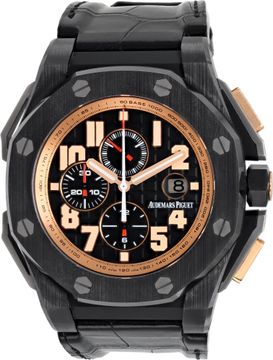Patek Philippe 3970 / Patek Philippe 5004 Watch Review
Patek Philippe 3970 vs Patek Philippe 5004 Watch Review
One of Patek Philippe’s best know Perpetual Calendar Chronograph watches is the
Reference 3970 model produced for nearly 20 years from 1986 to 2005.
The Patek Philippe 3970 combines two watch complications: The Perpetual
Calendar, which tracks the day, date, month, moonphase & leap year, with the
Chronograph complication used for timing racing with this stop watch feature.
The 3970, an outstanding example of a watch with multiple complications, has an
even more complicated companion in the Grand Complication line of Patek watches:
the reference 5004 model – produced from 1996 to 2011 – The two watches are
near twins in overall appearance but the 5004 has the additional complication of the
split-second chronograph. The Split-second chronograph (also known as a Dopple-
Chronograph, or Rattrapante) allows the user to time multiple fractions of an event,
or multiple 2nd competitors stopping and starting independently of one and other,
through the use of an additional pusher in the crown.
A closer look at these examples in our collection will show some their similarities
and differences:
The dial
Both models throughout their production lifetimes had some dial variations. In
these two examples it is easy to see differences in the hour-markers and the shape
of the hands but you can see that the layout of the dial and placement of the sub
dials are identical.
The dial displays a continuous subsidiary seconds dial, a 30 minute chronograph
register, and indication of the day, date, month, cycle of the leap year, 24 hour
AM/PM and the phases of the moon.
The case
Both watches have a 36mm case diameter. The overall shape of the case and lugs are
the same. Both watches feature a movement under glass sapphire crystal caseback
and an additional interchangeable solid case back.
There are two slight differences: the 5004 split-second Chronograph has slightly
protruding corrector buttons on the side of the case while those of the 3970 are
flush with the case. Also the 5004 case is slightly thicker – this was needed to house
the additional mechanical complication of the split-second Chronograph.
The Crown
One of the most easily recognizable differences between the watches is the crown.
In order to operate the Split-Second Chronograph an additional Chronograph button
is needed. This button is located in the center of the winding crown in the 5004.
The Movement
Both watches are based on a Lemania 2310 movement and much of the mechanism
is identical in the two watches. When you look closely at the movements of both
watches though through the sapphire crystal back, you can see the additional
complication of the split second near the center of the movement on the 5004.
Chronograph vs Split-Second Chronograph
The main difference of course between the two watches is in the functionality of a
chronograph watch versus a Split-Second Chronograph watch. A regular
chronograph watch works as a stop-watch to time an event. Pushing the top button
at 2 o’clock activates the chronograph and the center second hand begins timing.
Pushing the top button again will stop and restart the chronograph. With the
Chronograph stopped pressing the bottom button will reset the chronograph to
zero.
The Split-second Chronograph also works in this same way when timing a single
event. It has two center Second hands that travel around the dial in unison. Pressing
the center button in the winding crown will stop the first hand while the second
continues around the dial. Pressing the center button will re-synchrononize the two
hands. This type of timing could be useful for example if you are timing someone
running laps around a track you could time their overall time while also timing an
individual lap.
The Ref. 5004 Split Second chronograph is the most complicated model in Patek
Philippe’s line of stopwatches and demonstrates their expertise in the manufacture
of highly complicated timepieces.
Just In Time – Rolex Sea-Dweller 116660
NEXT ARTICLE
Patek Philippe 10-day Tourbillon 5101p






